#the broadberry
Text

For their Entertainment Tour show at The Broadberry in Richmond VA, Awsten wears Pleasures Olde English crewneck in orange (no longer available).
📸Jawn Rocha via Waterparks' Instagram
#awsten knight#waterparks#entertainment#entertainment tour#2018#the broadberry#pleasures#november 2018
2 notes
·
View notes
Text
Theed at Night

STAR WARS EPISODE I: The Phantom Menace 01:36:53
I didn't realize Guido's Tower and the Earl of Vis' banqueting rotunda actually appeared in the movie. I thought they were just added in for the Inside the Worlds/Complete Locations maps as filler. Pretty cool! (original scene lightened to show tower and rotunda)

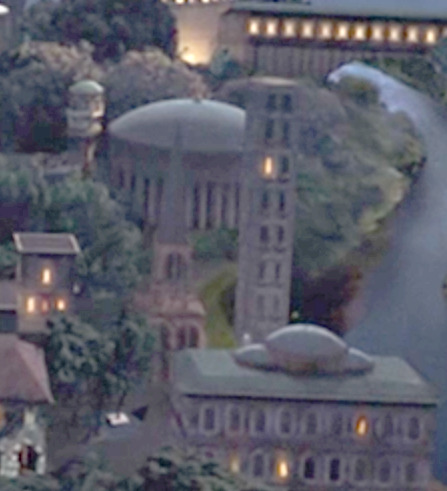
#Star Wars#Episode I#The Phantom Menace#Naboo#Theed#Theed Royal Palace#Six Virtues#AAT#Armored Assault Tank#Triumphal Arch#Banqueting Rotunda#Earl of Vis#King of Naboo#Broadberry Meadow#Guido's Tower#Solleu River
3 notes
·
View notes
Text
#soundcloud#emo rap#grunge#indie music#gbc#grungy aesthetic#00s#college#music#broadberry rva#lil uzi vert#recording academy#grammys#nedarbnagrom#camfolks
3 notes
·
View notes
Text



#images that make me feel like a slime mould#ough…#hanging out with the broadberry dog 💔💔💔#the mountain goats#it posts#tmg#john darnielle#peter hughes#jon wurster#matt douglas
24 notes
·
View notes
Text
of Montreal Interview: Making a Coherent Reality
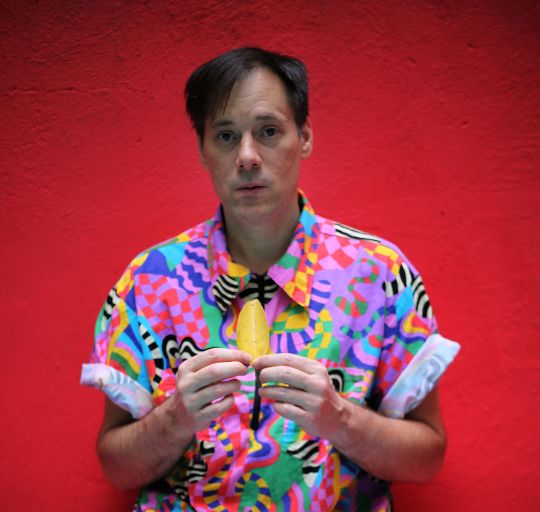
Photo by Christina Schneider
BY JORDAN MAINZER
Like their most beloved albums, of Montreal’s 18th full-length Freewave Lucifer f<ck f^ck f>ck is a poppy, spritely record born out of a period of intense grief. Isolated, Kevin Barnes, the Athens, GA collective’s only consistent member throughout its history, decided to dive into free associational lyrics and washy and chopped sonic experiments as a way to process the death of both their mother and their dog, not to mention the collective trauma of the COVID-19 pandemic.
Though 2020′s bright UR FUN was of Montreal’s most recent album for longtime label Polyvinyl, they self-released I Feel Safe With You, Trash in March 2021 on Bandcamp as part of the band’s Patreon. It’s the latter whose process and mindset became influential in the making of Freewave Lucifer f<ck f^ck f>ck. Barnes went into the studio and recorded a little bit each day, not trying to force any sort of aesthetic but making themselves work nonetheless. Naturally, some of the songs were inspired by what was going on in their life. “Marijuana’s a Working Woman”, referring to Barnes’ choice to switch out alcohol and welcome weed during the pandemic, sports psychedelic funk and piano obscured by effects, a sonic manifestation of their newfound drug of choice. “Ofrenda-Flanger-Ego-à Gogo”, on the contrary, juxtaposes sparkling synthesizers with lilting acoustic guitars, two cleaner sounds. From dance tunes to baroque pop to brooding 80′s synth anthems, Freewave Lucifer f<ck f^ck f>ck covers a lot of ground but never strays from Barnes’ ethos of catharsis.
Earlier this summer, I spoke with Barnes over the phone from their home in Athens about Freewave Lucifer f<ck f^ck f>ck’s free associational process, making political art, and being inspired by sci fi. Read our conversation below, edited for length and clarity.
Since I Left You: So many of the lyrics on Freewave Lucifer f<ck f^ck f>ck are free association. Do you find it easy or useful to look back and glean meaning from what came out, to pinpoint where things were coming from? Or do you let the lyrics be?
Kevin Barnes: It’s a combination of both. I realize I try to need to be coherent. Reality is totally incoherent, but we make it feel coherent because we have to. I realized that the same thing applies to art. You don’t really need to try to make it linear or sensible because people will connect the dots anyways, and they’ll do it in a more interesting way than if you said something really straightforward. That’s the way my mind works anyways: bouncing all over the place. It feels more natural and organic to write in a style that feels more abstract or like it has no meaning. It’s impossible to not have meaning, if that makes sense. It’s impossible to abstract something so much you can’t take anything from it.
SILY: How did these songs come about? Did you come up with the lyrics first and then the instrumentation?
KB: Some of the words had been written or started. I always keep a journal with lyrical ideas or any phrase that pops into my mind that has a rhythm to it I could sing. All of the music was created around the same time last year. I had just finished this double album I self-released on Bandcamp that I gave to our Patreon people. That was in the middle of the pandemic. I knew we wouldn’t be able to go on tour and thought it would be a cool way to add value to the Patreon thing. I hadn’t released a record in my own in a long time, and I wanted to try it. Polyvinyl then asked, “Ok, can you give us a record now?” I worked on it shortly after. I was still in the spirit of the last record, in the approach of not knowing what was gonna happen and experimenting in the studio every day. Not worrying so much about what was going to be the single.
I just wanted to make music every day. I just wanted to make sounds. I didn’t want each day to feel like every other day. There’s something I read or heard recently that was like, “If you see a problem and work towards fixing a little bit every day...” and the problem for me was not having a record. So I had to work on it a bit every day. That’s why it feels musically composed, like maybe I’ve made this one-minute thing yesterday and today I don’t feel like taking a verse-chorus-verse approach to it. Each section has its own identity and personality, and the songs themselves contain a bunch of little sections I glued together.
SILY: The album still seems pretty cohesive, and the songs themselves have a lot of segues between them. How much of the final product resulted from you going back in and switching the order of the tracks or playing with how up front your vocals were in the mix?
KB: I think the whole process was just an experiment and playing around in the studio. Because I worked by myself and didn’t have any outside collaborators, I was able to completely become immersed in the project. I didn’t move parts around that much, but I would use what I did the day before as inspiration for the next day. I wasn’t trying to make something jarring where the songs would have extreme tempo or key changes. I didn’t have a vision necessarily, just more fucking around and being open to whatever sounds happen, while still trying to push myself to make more interesting creative decisions and try to create interesting sounds--more so than trying to create catchy or infectious things.
SILY: I wouldn’t say the aesthetic of the album is radically different from other albums you’ve made, but it definitely has a unique sound. Looking back, was there something you were influenced by that pushed you in an aesthetic direction?
KB: It has a sadness to it. My mom died last year. My dog also died, the dog I had for 15 years. COVID endlessly continuing. I was in a dark place. When I’m in that dark space, I try to escape through music, through a different realm and mind space that’s more positive or amputated from the sad reality. In a way, being able to make the record was a therapeutic experience for me. Sonically, my influences were really just everything I listened to in my life up until this point, and trying to imagine future sounds as well.
SILY: There are moments on the record, like on “Blab Sabbath Lathe of Maiden”, where it unexpectedly turns dancey. Did that process of change in the song mirror what you were feeling in terms of finding unexpected moments of happiness within grief?
KB: I had to generate it more because it wasn’t happening organically in my life. It’s something I’ve done a lot in the past, like on Hissing Fauna, Are You The Destroyer? There are songs that sound happy but are lyrically sad because of the pain I’m going through in my life that’s extreme. But instead of making minor key music that feels like a funeral, I decided to fight it by making something more positive, colorful, and uplifting.
SILY: On “Après Thee Dèclassè”, you sing, “Logic is the enemy.” Is that the thesis statement of the record?
KB: That’s a reference to Trumpism/QAnon as well: “Even love has cold hands when logic is the enemy.” Those people have an alternate reality that isn’t the reality that any of my friends, family, or myself see. It’s such a strange time period with Trump and the conservative movement. It’s the complete antithesis of everything I feel and care about, and to see the country splitting so completely down the middle, it can’t help but have an influence on our consciousness and art.
SILY: I wouldn’t really call of Montreal a political band. But you’ve been in a liberal city in a historically conservative state for so long. Does that contrast specifically have any effect on what you sing about?
KB: It absolutely has an impact on my worldview. I’m constantly getting spammed by conservative political signs. Even though Athens is pretty progressive, there’s still a ton of conservatives here. Going for a drive, you’re just bombarded by conservative shit. I’m actually probably gonna move out of Georgia next year. I just realized, “Why am I here? Why do I continue to live in this place that’s so outside of my views?” Just by living here, I’m giving it a tacit approval. There’s two sides to it. There’s [the other] side that’s, “Liberal people are most needed in these red places.” But I don’t want to fight that battle. It seems so endless and pointless. I’d rather move to New England where people are more like-minded than be here with these fucking cavemen.
SILY: As someone who has lived in Illinois for most of his life, I can’t really relate. I do have friends in similar situations, though, who live in “blueberries in a bowl of tomato soup.”
KB: [laughs]
SILY: On the final track, “Hmmm”, you sing, “Grief is an anvil to the skull.” What do you mean there?
KB: Knowing you’re not alone only makes it sadder. I didn’t really get any comfort out of sharing the grief [of my mother’s death] with my family. It just sucks, and there’s nothing that can be done about it. You just have to feel the pain. There’s no way around it.
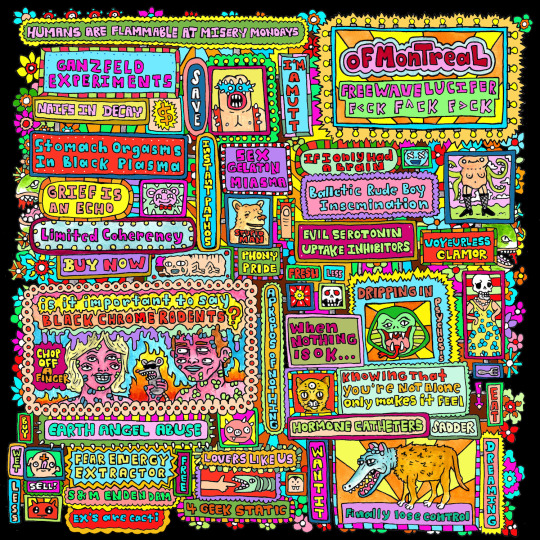
SILY: What’s the inspiration behind the album title?
KB: I don’t really believe any of this shit, but if I were to explain it, Lucifer is definitely more of a friend to humanity than God. Jesus is fine, but Lucifer seems more helpful to humanity. Lucifer gets a bad rep because of superstition. The whole thing’s made up anyways, but if I were to pray to anything, I’d be more likely to pray to Lucifer than I would to some saint or whatever. The freewave concept is something I came up with. It’s basically, “To be liberated is to ride the freewave.” Everything has “wave” next to it, like “vaporwave.” “Freewave” is my own designation for what kind of music this is. “Fuck Fuck Fuck” is a reference to all of the horrible shit that was going on [in the world].
SILY: How did the art and design of the cover come to be?
KB: My brother David created it, and his vision for it was to feel like Times Square, Tokyo, or Seoul, an area that has a ton of signage. But instead of the signs being for a ramen restaurant or tattoo parlor, the signs are the song titles and lyrics.
SILY: What’s your approach going to be for playing these songs live?
KB: The benefit that we have nowadays is that we can put things in backing tracks if sounds are impossible to reproduce. We can always use sampler pads. There are four other musicians in the band, and I’ll assign them parts that make sense for their station. Jojo [Glidewell] has 3-4 different synthesizers and keyboards. So I’ll assign him main keyboard parts. [Nicolas Dobbratz] does most of the lead guitars. [Clayton Rychlik] is doing all the drums. [Davey Pierce] is doing all the bass lines. Then the rest is me trying to figure out what I can tackle. What’s leftover will either be left out or be in backing tracks.
SILY: Does adapting songs live prove to be as rewarding as making them to begin with?
KB: It’s a very different experience. At first, it’s not at all satisfying--we’re lucky we do have a practice space where we’re not gonna get the cops called on us, but it’s never going to sound as good. It always sounds flat when we’re in the room, but it’s gonna sound good in a club with a PA system. I have to look in the future and imagine what it’s gonna sound like. Practice is a laborious process; we just have to get our parts down and feel comfortable with what we’re gonna do. Once we hit the stage, we’re gonna feel better.
I like making stuff. I don’t really like reproducing stuff as much.
SILY: Especially for something as layered as this record. Is this album deeply intertwined with its context?
KB: I would think that usually, but a lot of stuff I think is very personal, once we go on tour, I realize they’re universal themes. Things I thought would only be relevant to me are relevant to everybody. People will point out a lyric I hadn’t thought about that much and say, “That lyric meant a lot to me.” So it takes on a different life when you play it live.
SILY: Are you working on anything new?
KB: I’ve started working on the next record. I have 3 songs, I think. I’m in an interesting place right now. Sometimes, it takes a bit of time to catch the spirit of what I want to do next. I can tread water and float around in the studio and make something usable for the next thing I put out. I have to work that way. It would be pretty easy to not make anything ever and stare at the wall. [laughs] That’s what I love about making records. When I physically hold the vinyl or CD, I can think, “2018 didn’t get sucked into some vacuum. I have proof I existed.” So I’m always trying to work on things and get into the headspace that will be inspiring and stay in touch with that side of my brain so it never goes to sleep.
SILY: Is there anything you’ve been listening to, watching, or reading that’s caught your attention?
KB: I’ve been reading this Clive Barker book Imajica. I knew he made Hellraiser, but I didn’t realize he was also an author. A friend gave me the book. It’s a pretty long book, so it’s not an easy read, but I’ve been super into it. I’ve been getting more into sci fi stuff, like Ursula Le Guin. Sci fi films as well. I don’t know why, but sci fi has been a safe refuge for me.
SILY: Probably the same reason it is for a lot of people: imagining a different world.
KB: Totally. I feel like sci fi doesn’t get treated like a serious art form. People think it’s goofy or nerdy. But it’s really prescient. So much that has been written in sci fi novels becomes reality in 10-15 years. I think we should all be mining sci fi literature for answers. A lot of the times, it’s pretty dystopian, but that’s probably pretty realistic.
SILY: Was Le Guin a big influence on this record?
KB: I wouldn’t say I was taking inspiration. There are some lines that connect to Alice Bailey and thinking about spiritualists in the early 20th century and A Treatise on White Magic. I guess sci fi and magical thinking are often one in the same. Religion is magical thinking--it doesn’t exist in the physical world right now. But if you can imagine it, it’s magical thinking. On some level, knowing that there are so many humans that existed and exist now that were really brilliant and turned on, I get a lot of inspiration from those people. If you watch Tucker Carlson, you’ll get negative and depressed all the time. I guess people are hungry for bad vibes. I don’t understand the appeal of that shit. It’s so negative and pointless. It’s like lying in shit. I love discovering new authors and filmmakers that pull us out of that negative way of thinking. Not in complete fantasy, but depicting realities that we can identify with and spark our imaginations.
Tour dates
# w/ Locate S,1
$ w/ Le Pain
9/08: Athens, GA @ 40 Watt #
9/09: New Orleans, LA @ Howlin’ Wolf #
9/10: Austin, TX @ Mohawk #
9/12: Albuquerque, NM @ Sister #
9/13: Phoenix, AZ @ The Crescent Ballroom #
9/14: Los Angeles, CA @ Regent Theater #$
9/15: Berkeley, CA @ UC Theatre #
9/16: Eugene, OR @ WOW Hall #
9/17: Portland, OR @ Wonder Ballroom #
9/18: Seattle, WA @ Neumos #
9/19: Missoula, MT@ The Wilma #
9/20: Salt Lake City, UT @ Metro #
9/21: Englewood, CO @ Gothic Theatre #
9/22: Lawrence, KS @ The Granada #
9/23: St. Louis, MO @ Red Flag #
9/24: Atlanta, GA @ Buckhead Theatre #
10/04: Carrboro, NC @ Cat’s Cradle #
10/05: Richmond, VA @ Broadberry #
10/06: Washington, DC @ 9:30 Club #
10/07: Brooklyn, NY @ Elsewhere #
10/08: Cambridge, MA @ Sinclair #
10/09: Philadelphia, PA @ Theatre of the Living Arts #
10/10: Cleveland, OH @ Beachland Ballroom #
10/11: Detroit, MI @ Magic Stick #
10/12: Milwaukee, WI @ Turner Hall #
10/13: Minneapolis, MN @ Fine Line #
10/14: Chicago, IL @ Lincoln Hall #
10/15: Cincinnati, OH @ Woodward Theater #
10/16: Asheville, NC @ The Grey Eagle #
youtube
#interviews#of montreal#polyvinyl#clayton rychlik#locate s 1#40 watt#the howlin wolf#mohawk#sister#the crescent ballroom#regent theater#uc theatre#WOW Hall#wonder ballroom#neumos#the wilma#metro music hall#gothic theatre#red flag#broadberry#9:30 club#elsewhere#the sinclair#turner hall#fine line#lincoln hall#woodward theater#the grey eagle#freewave lucifer fuck fuck fuck#christina schneider
8 notes
·
View notes
Text
Kolektif – Modern Avrupa’nın Ekonomik Tarihi (2023)
Avrupa’ya kimlik kazandıran en başat unsur ekonomidir.
Ekonominin seyri modern Avrupa’nın kökeninde yer bulmuş, demografiden sanata kadar sayısız alanı değiştirerek modernizmin inşaatındaki harç hâline gelmiştir.
Stephen Broadberry ve Kevin H. O’Rourke editörlüğünde hazırlanan ‘Modern Avrupa’nın Ekonomik Tarihi (1700-1780)’ bu bilinçle derlenmiş göz alıcı bir çalışma.
Sanayi Devrimi’nden başlayan…

View On WordPress
#2023#Barış Tunçtekin#Kevin H. O’Rourke#Modern Avrupa’nın Ekonomik Tarihi (1700-1870)#Onur İşci#Selenge Yayınları#Stephen Broadberry
0 notes
Text
Higher - Sleep Token
The Broadberry, VA - 2022
33 notes
·
View notes
Text






thursday tonight at the broadberry in richmond!
21 notes
·
View notes
Text
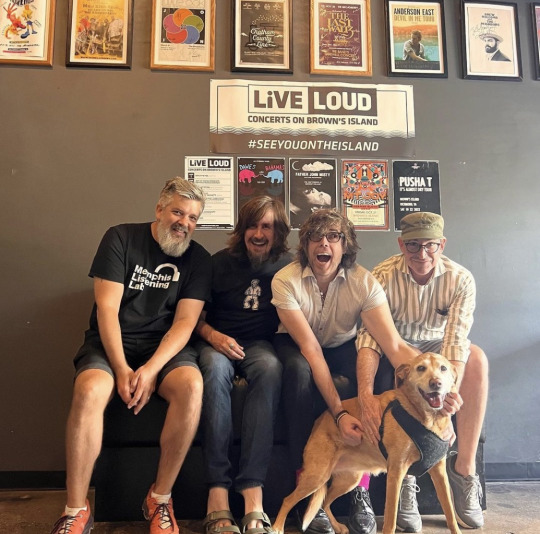
Matt Douglas, John Darnielle, Jon Wurster, and Peter Hughes with Rawksmore the venue dog. The Broadberry, 2022.
120 notes
·
View notes
Text
'Part of the reason for turning inward was a particular interpretation of history. The belief that richer countries were successful because they protected manufacturing gave respectability to industrial policy. That turned out to be a misreading of history. Despite high tariffs, the United States developed as an open economy—open to immigration, capital, and technology—and one with an exceptionally large domestic market that was fiercely competitive. Furthermore, the high-tariff United States overtook free-trade Britain in per capita income in the late 19th century by increasing labor productivity in the service sector, not by raising productivity in the manufacturing sector (Broadberry 1998). In Western Europe, growth was related to the shifting of resources out of agriculture and into industry and services. Trade policies designed to protect agriculture from low prices likely slowed this transition in countries such as Germany. While across-the-board import substitution fell out of favor decades ago, the debate over industrial policy continues to this day. The experience of successful East Asian countries has given it a positive gloss, but even here standard history can mislead.
In 1960, South Korea was saddled with an overvalued currency and exports of just 1 percent of GDP. The country’s ability to import depended almost entirely on US aid. After devaluing its currency in the early and mid-1960s, Korea’s exports became more competitive and exploded, reaching 20 percent of GDP by the early 1970s. The main policy involved setting a realistic exchange rate that allowed exports to flourish along with cheaper credit for all exporters, not targeted industries (Irwin 2021). Industrial policy did not really start until the Heavy and Chemical Industry Drive of 1973–79, which was later terminated because of its excessive costs and inefficiency. But Korea’s rapid growth had already been unleashed before the industrial policy era. The debate over industrial policy has long been locked in a stalemate. Some see it as essential to productivity growth and structural transformation, while others see it as abetting corruption and fostering inefficiency. Some point to Argentina’s costly attempt to promote the assembly of electronics in Tierra del Fuego, while others point to gleaming high-tech factories in China and Korea. The effects are easy to exaggerate. Quantitative models suggest that the gains from even optimally designed industrial policies are small and unlikely to be transformative (Bartelme and others 2021). What is new is that the United States has joined China in an explicit embrace of industrial policies.'
Douglas Irwin for IMF
3 notes
·
View notes
Text

Thu/Jun 8 Minneapolis - Fine Line https://www.axs.com/events/479866/wavves-cloud-nothings-tickets?skin=fineline
Fri/Jun 9 Chicago - Metro https://www.etix.com/ticket/p/5471135/
Sat/Jun 10 Detroit - El Club https://link.dice.fm/Ga82221e502e
Sun/Jun 11 Cleveland - Beachland Ballroom http://seetickets.us/cloudnothingscle23
Tue/Jun 13 Buffalo - Rec Room https://aftr.dk/3UboyHd
Wed/Jun 14 Toronto - Phoenix https://www.showclix.com/event/wavves-cloud-nothings/pre-sale
Fri/Jun 16 Boston - Paradise https://www.ticketmaster.com/event/01005E84CC1D371C
Sat/Jun 17 New York - (Le) Poisson Rouge https://link.dice.fm/E15a814e220d
Sun/Jun 18 Philadelphia - The Foundry https://www.ticketmaster.com/event/02005E85953F2319
Tue/Jun 20 Washington- Union Stage https://www.unionstage.com/shows/wavves-cloud-nothings/
Wed/Jun 21 Richmond - The Broadberry https://bit.ly/WavvesCloudNothings6-21
Fri/Jun 23 Atlanta-Masquerade Heaven https://www.ticketmaster.com/event/0E005E84E18B479C
Sat/Jun 24 NashvilleEastside Bowlhttps://www.seetickets.us/event/Wavves-andCloudNothings/544090
Mon/Jun 26 Austin - Mohawk https://wl.seetickets.us/event/Wavves-CloudNothings/544292?afflky=ResoundPresents
Tue/Jun 27 FT. Worth - Tulips https://www.prekindle.com/promo/id/532452769348132168
Thur/Jun 29 Santa Fe - Sister https://www.eventbrite.com/e/wavves-and-cloud-nothings-tickets-614353707477
Fri/Jun 30 Phoenix - The Crescent CN https://www.ticketweb.com/event/wavves-cloud-nothings-crescent-ballroom-tickets/13115665?pl=crescent
Sat/July 1 San Diego - Observatory NP https://www.ticketmaster.com/event/0B005E85FBFF28EF
Sun/July 2 Santa Ana - Observatory OC https://www.ticketmaster.com/event/09005E84F65F330A
Mon/July 3 - Los Angeles - The Regent https://www.ticketmaster.com/event/09005E841C333F7F
Wed/July 5 San Francisco - The Independent https://www.ticketweb.com/event/wavves-and-cloud-nothings-the-independent-tickets/13124305?pl=independentsf
Thur/July 6 Sacramento - Harlow’s https://www.etix.com/ticket/p/2499219/wavves-and-cloud-nothingswith-ultra-q-sacramento-harlows
2 notes
·
View notes
Text
Theed
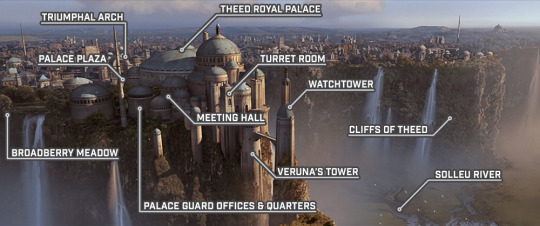
STAR WARS EPISODE I: The Phantom Menace 00:08:55
#Star Wars#Episode I#The Phantom Menace#Naboo#Theed#Theed Royal Palace#Palaze Plaza#Turret Room#Triumphal Arch#Broadberry Meadow#meeting hall#watchtower#Cliffs of Theed#Solleu River#Palace Guard offices & quarters
1 note
·
View note
Text
CamFolks & GENDELL Live at HU
#soundcloud#grunge#emo rap#indie music#grungy aesthetic#college#00s#music#broadberry rva#upcoming#glowingskin#runescape#idk#nirvava
4 notes
·
View notes
Note
🦎!


Couldn’t choose between these two [The Broadberry, Richmond, VA, 08/28/22]
5 notes
·
View notes
Video
ILS - No Soul (Vocals Declan Broadberry Mix) 2002
0 notes
Text
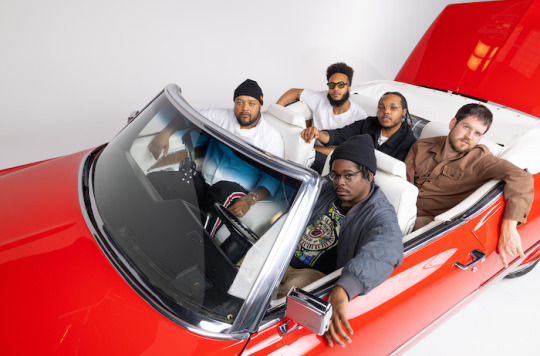
Butcher Brown's Solar Music is the next phase of their jazz-based exploration into Black pop. The Richmond, Virginia band's musical inclusiveness is the central inspiration of the new album. The title refers back to the saying "Everything under the sun." The band's creative choices have a long lineage going back to Roy Ayers, A Tribe Called Quest, Guru's Jazzmatazz, Digable Planets, Roy Hargrove, and Robert Glasper. The kinship between jazz, hip-hop, and R&B is a fluid movement for Butcher Brown and their latest addition to the conversation builds each song with playing that swings regardless of the styles in the mix.
"Espionage" featuring guitarist Charlie Hunter stirs like a '60s soul jazz cookout complete with a funky organ and solos that would make Eddie Hazel proud. They take another trip and make house music from Detroit, Baltimore, Chicago, and London their destination with "MOVE (Ride) featuring East London artist Jay Prince. "Turismo" is another escape into dance music reminiscent of the days of Roni Size's drum and bass hyper rhythms. "Eye Never Knew" conjures up a kettle of modal jazz and poetry when genre shapeshifter Pink Siifu whispers and Keyon Harrold's trumpet blows sketches in the air. The collaborations are fresh and Butcher Brown's grooves keep the album interesting. Limited red vinyl copies of Solar Music and merchandise are available with the usual streaming options. Their global tour started this week and tickets can still be purchased.
Butcher Brown Tour Dates
10/12 - Reno, NV - University of Nevada, Reno - Nightingale Concert Hall
10/17 - Boston, MA - Brighton Music Hall
10/18 - New York, NY - (Le) Poisson Rouge
10/20 - Charlottesville, VA - The Southern Café and Music Hall
10/21 - Philadelphia, PA - World Cafe Live (upstairs)
10/22 - Pittsburgh, PA - Club Cafe
10/24 - Minneapolis, MN - Dakota
10/25 - Chicago, IL - Sleeping Village
10/26 - Detroit, MI - El Club
10/27 - Indianapolis, IN - Jazz Kitchen
11/4 - Eindhoven, NL - So What’s Next?
11/6 - London, UK - The Forge
11/7 - Antwerp, BE - De Roma
11/8 - Berlin, DE - J.A.W. (Zenner)
11/9 - Mannheim, DE - Alte Feuerwache
11/10 - Técou, FR - Coco Jazz
11/11 - Groningen, NL @ Rockit
11/12 - Rotterdam, NL - Rooterdam / Bird
11/13 - Amsterdam, NL - Bimhuis
11/14 - Charloeroi, BE - Palais des Beaux Arts
11/15 - Paris, FR - Le Trabendo
11/18 - Eilat, IL - Red Sea Jazz Festival
11/24 - Richmond, VA - The Broadberry
11/25 - Washington, DC - Atlantis
12/5 - Seattle, WA - Madame Lou’s
12/6 - Portland, OR - The Get Down
12/7 - San Francisco, CA - The Independent
12/8 - Santa Cruz, CA - Kuumbwa
12/9 - Los Angeles, CA - Lodge Room
12/10 - San Diego, CA - House of Blues, Voodoo Room
youtube
1 note
·
View note